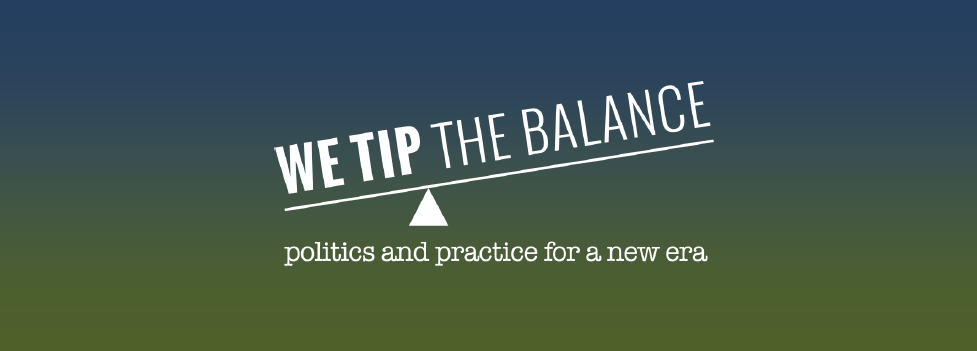Changing Politics
Learning how to order our lives together anew, determined in large part by the when, why and how of our engagements with others, culminates in collective actions that have the potential to change our political systems.
We Tip the Balance: Beyond progressive politics (to cultural production)
Emergent Political Systems: Principles, practices and institutions
In what ways does liberalism/our worldview shape and limit our behavior and choices? What is important to understand about liberalism in order to support systemic transformation? In what ways have you engaged (or not engaged) politically in the past? Has it changed? How do you explain why that change happened and it’s implications or value? Or, put differently, how would you explain and describe your current political priorities or engagement?
Theory of Change
Far from our politic system changing in isolation of other systems of which we’re a part, multiple aspects of our lives are in a state of disequilibrium simultaneously. Paradigmatic change implies change in every realm of life, even in how we understand change itself!
Paradigm Change
About the Approach
We Tip the Balance is my way of continuing learning with others how to build the world we want to live in together. My ideas about how change occurs inform the approach I take to this politics and practice for a new era, emerging through systems transformation.
Graphic: An Integrated Approach to Change
Here is a graphic representation of this integrated approach to change.
Model: Fractals of Change
This model looks at the fractal nature of change across three systems: living, social and human. What does the model say to you about the integral nature of change? Is that useful? If so, how?
Basic Units of Measure
Coming soon
Case Study
Where are we now? Assessment and planning
Personal Change
Because the era which is ending is shaped by liberal progressivism, it makes sense then that one of the tasks at hand is to overcome the ways in with liberal progressiveness informs, and therefore also limits, our own mindsets and expectations.
Inclusion Stories
Inclusion stories describe the specific ways individuals and communities have come to participate in and benefit from a dominant, often heartless, culture. More than a tool for learning to connect with others across difference, inclusion stories can open up new paths for understanding the systemic, historic roots causes of our divisions from others; from our own families’ history, culture and values; and within ourselves.
[Examples from my own inclusion story coming soon.]
What is your inclusion story? In what ways do you participate in, benefit from and/or help maintain the culture and institutions upon which our future depends on their transformations? In what practical, material ways are you well-positioned to change? What personal, internal, emotional work does this bring up?
Overcoming Liberal Progressive Barriers to Action
Study the table. For each of the “Messages We Receive” (across the top), come up with a concrete example of how it manifests in your life, either for you or that you are aware of otherwise.
How does the awareness of cultural barriers and the emotional responses they illicit (see table) open up other possibilities for action? Do you see any new ways to move forward or uncomfortable places to sit?
Competencies
These are competencies for contributing meaningfully to social change efforts that can address root causes of the crises we face: emotional intelligence, access to information and knowledge of history, learning skills, sense of responsibility, social skills, and action. These are competencies for acting in alignment with our values in a world in which that can be so difficult to do. They increase our emotional courage and support, historic and systemic understanding, and skills and tools to contribute meaningfully to social change efforts that can address root causes of the crises we face.
Where do you see areas for growth? Get uncomfortable. What little things could you acknowledge and incorporate to increase your competencies as a change maker?
Seeking out change beyond “Progress”
Get paper and pencil. Fill in the blanks with as many ideas/answers you can think of; write your ideas down. Then choose Slide Show from the top bar and hit enter to uncover my answers. How similar were yours? Were there any more useful than any others? Why or why not? How or how not?
Where on the table do your actions land? Do they align with your values and intentions? How those contradictions manifest can say a lot about the ways we participate in the systems we also strive to transform.
